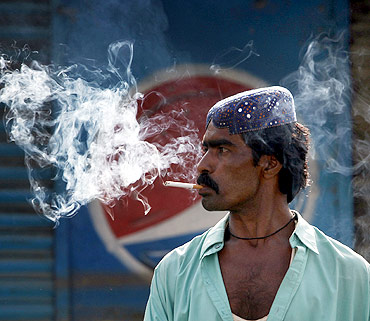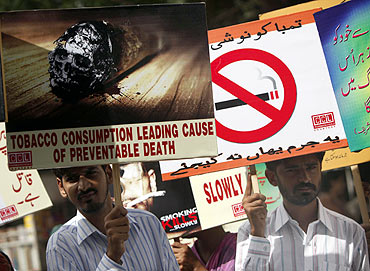The number of deaths in Pakistan due to tobacco consumption is much higher than those caused by suicide attacks, terrorism, HIV/AIDS, tuberculosis, malaria and other fatal diseases in the country.
The consumption of tobacco claims over 1,00,000 lives annually in Pakistan, the
Daily Times quoted health experts, as saying at a news conference under the banner of National Alliance for Tobacco Control.
...
Head of Pulmonary Medicine at Aga Khan University and NATC Chairman Prof Javed Khan said that despite well-known hazards and catastrophic effects of tobacco consumption, the profits from its business continue to soar and sales of cigarettes consistently increase.
"The sale of cigarettes rose from 5,000 billion to 5,900 billion sticks a year in 2009", he informed.
"Smoking and other means of tobacco consumption kill more people annually than alcohol, Aids, accidents, illegal drugs, murders and suicides combined altogether," he said.
Tobacco was responsible for 5.4 million deaths in 2010, and this toll is expected to rise to 10 million by 2025 if the pandemic goes unchecked, he added.
Dr Khan claimed that over half of Pakistan s adult population was addicted to one or other form of tobacco. He said that increased taxation on tobacco products and the implementation of smoking ban at public places are the two most important requirements for checking the rise in tobacco consumption.
The Head of Chest Diseases Department at Jinnah Postgraduate Medical Centre, Professor Nadeem Rizvi, also deplored that despite excellent anti-smoking laws in Pakistan, the government was not serious for their implementation.
He said that according to their own survey, 85 per cent tobacco selling outlets in the city are still selling cigarettes to minors, and despite a ban on smoking at national universities, smoking was not barred at 95 per cent of them.


